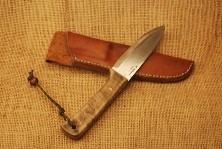



I love feed back on my knives, so if you have any comments or suggestions feel free to pass them along. If you have any photos of you and the knife you purchased send them along also... especially field photos. Thanks






Tactical Series
* 9 to 11” over all length,
* 4-½ to 6” spear point blade 1/8 to 3/16 thick
* Full tang, preferably with a 90’ spine on blade to at least the half way point.
Note: Opinions vary on steel types “High carbon vs Stainless”





“I try to make knives that are functional as well as beautiful. I believe knives are tools to be used, not just pieces of art. Collecting custom knives is a big part of the knife industry, I design mine for their practical use. I make every knife as if it’s going to be mine and that my life may depend on it someday.”
Wayne Wilhelm


“When I'm asked what the best Survival knife is, I say that it’s the one
you have with you at the moment you find your self in a survival situation”































































































































































































































“It is easier to make a large knife do small things well,
than it is to make a small knife do large things well.” -Author Unknown-
The difference is between a Bush Craft Knife, a Tactical knife, and a Survival knife is… simply, very little. A Bush Craft knife and a Tactical Knife both become a Survival knife if you find your self in a potentially life threatening situation. The difference between the two knives will depend on the users operational requirements.
The Bush Craft woodsman operating close to home or close to his vehicle can have access to axes saws machetes and may only need to carry a 3-1/2 to 4 1/2” blade for routine day to day cutting jobs. On the other hand when he decides to venture out into the wilds he will only have what he is carrying, and that's when a more substantial knife should be considered. The most important use for a bush craft knife is to cut material for building shelter and processing wood for a fire.
The modern tactical knife is by design a compromise. It needs to be light enough to carry at all times of operation, be a weapon as well as versatile enough to make shelter or process material for fire making. Once again operational requirement will dictate knife size. A solider working with a team in full battle rattle with a tactical knife attached to his IBA will probably opt for a knife with no more than a 10” overall length. Yet jungle operations may dictate something resembling the larger, more traditional bush knife.
“So what is a Survival Knife?” It’s the knife you have with you when you find your self in a survival situation. Life is full of choices. The Carpenter picks a framing hammer to frame a wall, and a finishing hammer to trim a cabinet. The outdoors man chooses the knife he’ll carry according to the mission ahead. We don’t as a general rule head into the wilderness expecting to put ourselves in life and death situations, but bad things do happen. When we are practicing our skills we may test our ability's against mother nature, but we have or should have, back up plans. Proper training teaches you to plan for the worst and hope for the best. Chose your equipment carefully.
So, if you feel you need a Bush Craft Survival style knife,it should have a minimum of a 5 to 6” blade, full tang and a 90’ spine. ( I prefer Carbon Steel over stainless). Start by buying the best boots and knife you can afford, and in that order, with out the boots you don’t need to be out where you’ll need the knife.




















































































































Question: What is the difference between a Bush Craft Knife a Tactical knife and a Survival knife?















































































































































































































































































































































































































